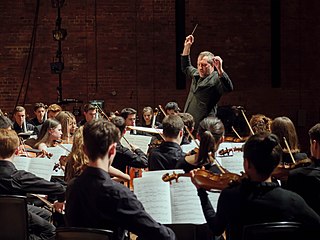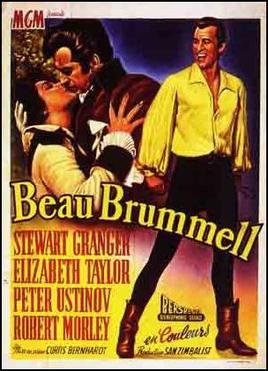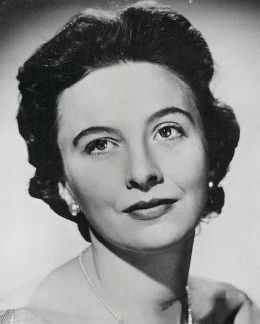Related Research Articles

The Aldeburgh Festival of Music and the Arts is an English arts festival devoted mainly to classical music. It takes place each June in the town of Aldeburgh, Suffolk and is centred on Snape Maltings Concert Hall.

George Bryan "Beau" Brummell was an important figure in Regency England, and for many years he was the arbiter of British men's fashion. At one time, he was a close friend of the Prince Regent, the future King George IV, but after the two quarrelled and Brummell got into debt, he had to take refuge in France. Eventually, he died shabby and insane in Caen.

Stuart Oliver Knussen was a British composer of contemporary classical music and conductor. Among the most influential British composers of his generation, his relatively few compositions are "rooted in 20th-century modernism, [but] beholden to no school but his own"

A burlesque is a literary, dramatic or musical work intended to cause laughter by caricaturing the manner or spirit of serious works, or by ludicrous treatment of their subjects. The word derives from the Italian burlesco, which, in turn, is derived from the Italian burla – a joke, ridicule or mockery.

Thomas Joseph Edmund Adès is a British composer, pianist and conductor. Five compositions by Adès received votes in the 2017 Classic Voice poll of the greatest works of art music since 2000: The Tempest (2004), Violin Concerto (2005), Tevot (2007), In Seven Days (2008), and Polaris (2010).

Noye's Fludde is a one-act opera by the British composer Benjamin Britten, intended primarily for amateur performers, particularly children. First performed on 18 June 1958 at that year's Aldeburgh Festival, it is based on the 15th-century Chester "mystery" or "miracle" play which recounts the Old Testament story of Noah's Ark. Britten specified that the opera should be staged in churches or large halls, not in a theatre.

Ivanhoe is a romantic opera in three acts based on the 1819 novel by Sir Walter Scott, with music by Sir Arthur Sullivan and a libretto by Julian Sturgis. It premiered at the Royal English Opera House on 31 January 1891 for a consecutive run of 155 performances, a record for a grand opera. Later that year it was performed six more times, making a total of 161 performances. It was toured by Carl Rosa Opera Company in 1894–1895 but has rarely been performed since. The first complete, fully professional recording was released in 2010 on the Chandos Records label.

Beau Brummell is a 1954 British historical film released by Metro-Goldwyn-Mayer. It was directed by Curtis Bernhardt and produced by Sam Zimbalist from a screenplay by Karl Tunberg, based on the 1890 play Beau Brummell by Clyde Fitch. The play was previously adapted as a silent film made in 1924 and starring John Barrymore as Beau Brummell, Mary Astor, and Willard Louis as the Prince of Wales.
Gordon Crosse was an English composer.
Cheryl Ann Frances-Hoad is a British composer.
The Bear is the second of the two operas by William Walton, described in publication as an "Extravaganza in One Act". The libretto was written by Paul Dehn and Walton, based on the play of the same title by Anton Chekhov.
(Albert) Meredith Davies CBE was a British conductor, renowned for his advocacy of English music by composers such as Benjamin Britten, Frederick Delius and Ralph Vaughan Williams.

The Little Sweep, Op. 45, is an opera for children in three scenes by the English composer Benjamin Britten, with a libretto by Eric Crozier.

April Rosemary Cantelo was an English soprano. She created roles in operas by major composers, including the title role of Semele by John Eccles, Helena in Britten's A Midsummer Night's Dream, and in several works by Malcolm Williamson such as English Eccentrics.

Lambertus Reiner "Reinbert" de Leeuw was a Dutch conductor, pianist and composer.
Elena Langer is a Russian-born British composer of opera and other contemporary classical music. Her work has been performed at the Royal Opera House, Zurich Opera, Carnegie Hall, Richard B. Fisher Center for the Performing Arts, Stanislavski and Nemirovich-Danchenko Moscow Academic Music Theatre, Shakespeare's Globe, Wigmore Hall, Opera national du Rhin, Strasbourg, and Milton Court, Barbican Centre. She studied piano and composition at the Gnessin State Musical College in Moscow and composition at the Moscow Conservatoire; in 1999 she moved to London and studied composition at the Royal College of Music (1999–2000) with Julian Anderson and the Royal Academy of Music (2001–03) with Simon Bainbridge.
Joseph Phibbs is an English composer of orchestral, choral and chamber music. He has also composed for theatre, both in the UK and Japan. Since 1998 he has written regularly to commissions for Festivals, for private sponsors, and for the BBC, which has broadcast premieres of his orchestral and chamber works from the Proms and elsewhere. His works have been given premieres in Europe, the United States and the Far East, and he has received prestigious awards, including most recently a British Composer Award, and a Library of Congress Serge Koussevitzky Music Foundation Award. Many of his works have been premiered by leading international musicians, including Dame Evelyn Glennie, Esa-Pekka Salonen, Leonard Slatkin, Sakari Oramo, Vasily Petrenko, Gianandrea Noseda, and the Belcea Quartet.

Brummell is a 1931 operetta in three acts and five scenes by Reynaldo Hahn to a libretto by Rip and Robert Dieudonné. Its protagonist is the English dandy Beau Brummell (1778-1840), although the storyline is entirely fictional.
Paul Charles Marie Curet, called Puget was a French composer.
References
- ↑ The W. H. Auden Society – Newsletter No. 15, Notes and Queries, November 1996
- ↑ Covell, R. The English Eccentrics. In: The New Grove Dictionary of Opera . Macmillan, London & New York, 1997.
- 1 2 3 Jacobs, Arthur. Non-Opera and Noh-Opera. Opera , August 1964, Vol.15 No.8, p531.
- ↑ Goodwin, Noël. Review of English Eccentrics. Trinity College of Music Opera Group. Opera, August 1990, Vol.41 No.8, p999-1000.
- ↑ Morley, Christopher. Review of English Eccentrics at Birmingham Conservatoire. Opera, May 2006, Vol.57 No.5, p590-591.
- 1 2 Third Programme, 11 June 1964, Radio Times, No. 2117, 4 June 1964, p49.